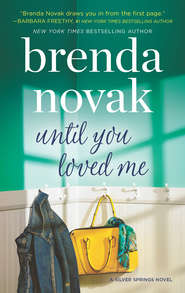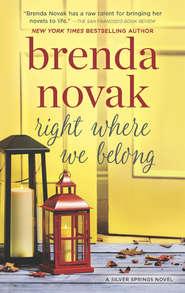По всем вопросам обращайтесь на: info@litportal.ru
(©) 2003-2025.
✖
Sanctuary
Автор
Год написания книги
2019
Настройки чтения
Размер шрифта
Высота строк
Поля
And here they were eleven years later. A lump swelled in Hope’s throat. Faith might have been overlooked by others, but she’d always been Hope’s favorite. More sensitive than the rest, she’d always soothed Hope.
“Faith, we’re home,” she said, gently shaking her shoulder.
Faith blinked and sat up. “I should have kept you company on the drive, Hope. I’m sorry.”
“No. It was better that you slept, better for the baby.”
Her sister’s gaze circled the garage. For a moment she looked completely bewildered. “This is your house?”
“Just the garage. And I don’t own it. I rent.”
Faith climbed out, following wordlessly as Hope led her around to the front of the house, where she nearly tripped over Oscar, a large gray cat, who screeched and ran for cover.
“What was that?” Faith asked as he slipped into the hedge separating her house from his owner’s and crouched to glare at them.
“That’s Oscar,” Hope said.
“Your cat?”
“He belongs to my neighbor, but I think he’s trying to move in with me. He comes over all the time.”
“Do you feed him?”
“Occasionally. Mr. Paris doesn’t mind. I guess we sort of share him. Oscar generally won’t let anyone but Mr. Paris touch him, anyway, so it doesn’t matter much. He just hangs out on his own.” A cat after her own heart, Hope added silently.
Bending, Faith held out her hand to coax him closer, but he was still put out by his close call. Whisking his tail in a show of irritation, he didn’t budge.
Hope unlocked the front door and swung it open. “He’s not very friendly, but I admire his independence.”
“I like cats.” Faith peeked into the house. “Do you live alone?”
“I’ve had roommates in the past, but ever since I started making enough to afford the rent, I’ve been living alone,” Hope said, holding the door.
Faith still hesitated at the threshold, glancing toward Oscar as though she’d rather hide out with him in the hedge. Probably the idea of moving in with Hope made a decision that had been somewhat impulsive now seem permanent. “So you’ve never been married or…or anything?”
“No. No husbands, no live-in lovers, no steady boyfriends.”
Faith finally stepped into the living room. “And you’re not seeing anyone?”
Hope thought of Jeff, her neighbor’s son from down the street, and the doctors, male nurses and other hospital staff who asked her out on occasion. She knew they talked about her, perceived her coolness as a challenge. But no one had managed to pique her interest. She wanted a husband and family eventually, but the moment whoever she was seeing began to push for commitment, she felt such a terrible panic she broke off the relationship. “Not really,” she said.
“But you’re so pretty.”
Hope chuckled. “I guess I’m a little jaded,” she said, nudging her sister farther inside.
The house smelled of the fresh flowers Hope routinely cut from her garden in back and kept in a small tin bucket on the kitchen table. She liked the contrast of fragile versus resilient, old versus new, delicate versus careworn.
Hope flipped on the light. “What a beautiful home,” Faith breathed, almost reverently.
Hope took a moment to see her surroundings through Faith’s eyes. The house was old. It still had its original hardwood floors and plaster walls, but had been remodeled so that the front room, which had once been a porch, was enclosed by a series of paned windows. The rooms were spacious, despite the fact that the house was only about a thousand square feet. The kitchen opened into the family room, both of which could be seen from the front entrance. An office, set off by double doors, opened to the left. The hall that led to both bedrooms branched off to the right.
“Did you decorate this place all by yourself?” Faith asked.
Hope nodded. “On weekends I search the classifieds looking for treasures, and I often pick up a piece of furniture for a fraction of its value. I fix and refinish wooden items in the garage, if I want the grain of the wood to shine through. Or I paint or stencil on various pieces I find, like that old church pew in the kitchen.”
“It’s lovely,” Faith said.
Hope dropped her keys on the counter. “An old widower down the street owns the house, but I take good care of it, so he pretty much lets me have free rein.”
Faith continued to walk through the main rooms before pausing in front of an arrangement of cross-stitch samplers on the kitchen wall. Large and elaborate, there was one for each season. “These are great,” she said.
“Thanks.” Hope liked to cross-stitch and collect odds and ends. Her dishes, silverware and linens were all mismatched antiques or one-of-a-kind items, like the Flow-blue plates and creamers from seventeenth-century England that adorned the white, built-in shelves on either side of the fireplace in the kitchen/living room.
“You must make a lot of money to live like this,” Faith said. “I’ve never seen anything more charming.”
“I don’t make a lot of money,” Hope said with a laugh, “but I grew up in the same household as you, remember? I know how to stretch a dollar.”
Faith cocked an eyebrow at her. “You’re better at it than I am.”
“Don’t be too hard on yourself. This is just my version of The Boxcar Children. Remember that book? I used to read it to you when you were little.”
“I do,” Faith said. “It was my favorite.”
“This might sound silly, but when things got really tough for me after I left Superior, I used to pretend I was one of those children, finding or making what I needed out of the things other people discarded.” She moved into the kitchen to check the answering machine on the breakfast bar. No calls. Not unusual.
“I can’t believe you’ve done all this.”
“It’s nothing.” Hope changed the subject because her sister’s praise made her feel guilty for having so much when her family had so little. “You said you were living with two of Arvin’s other wives. Which ones?”
Faith paused next to the black-iron baker’s rack where Hope stored her pasta and cereals in uniquely shaped jars. “Do you remember Ila Jane?”
“That old battle-ax?”
A smile flickered at the corners of Faith’s lips. “She’s the only one of us who ever dares put Arvin in his place. He likes her cooking but doesn’t bother her for anything else, and she’s happy that way. Being around her was actually the best part of being married to Arvin. She took me under her wing, like another daughter. Her oldest is close to my age, anyway. But I’m not fond of Charlene, Arvin’s second wife. She lives with us, too. Her children are especially difficult, like her, all except little Sarah. Sarah’s only seven, but Charlene ignores her, so she spends most of her day with me.”
“Is Charlene still pretty?”
“Pretty enough, I guess. She’s given Arvin ten kids, so she’s done well by him.”
Hope no longer agreed with using that kind of measuring stick for a woman’s success, but she knew it would take a while for Faith to understand and adjust, so she said nothing. “Does he spend much time with Ila Jane or Charlene?”
“No, or his children, either. When he moved me into that old house on Front Street—”
“Not the big yellow one,” Hope interrupted. “We always thought that house was haunted, remember? We’d dare each other to ring the bell, and then we’d run.”
“That was when the Andersons lived there, and old lady Bird, Sister Anderson’s mother, used to sit rocking in the window of the attic for hours.”
“I take it she’s passed away.”











